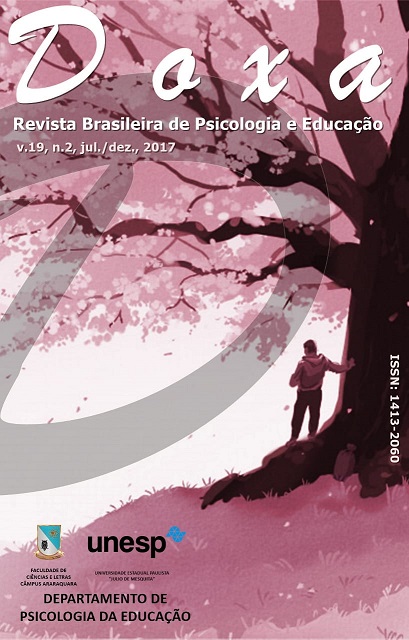Nativos digitais: considerações sobre os alunos contemporâneos e a possibilidade de se (re)pensar a prática pedagógica
DOI:
https://doi.org/10.30715/rbpe.v19.n2.2017.10955Palavras-chave:
Nativos digitais. Prática pedagógica. Tecnologias digitais da informação e comunicação. Educação.Resumo
Nosso objetivo nesse artigo é realizar uma discussão teórica e analisar alguns dados empíricos de uma pesquisa a qual relaciona os nativos digitais e a prática pedagógica em escolas dos anos iniciais do ensino fundamental mediada pelas Tecnologias Digitais da Informação e Comunicação (TDIC). Estudos apontam mudanças no processo educativo e nas interações sociais, mediadas pelas tecnologias, dos nativos digitais. Utilizamos apoio de estudos teóricos para fundamentar nossas discussões, apresentamos os dados coletados com os alunos dos anos iniciais do ensino fundamental, considerados nativos digitais e relacionamos sua análise com a possibilidade de se (re)pensar a prática pedagógica, uma vez que as TDIC estão presentes na vida social e na mediação da aprendizagem desses nativos digitais. A discussão sobre essas temáticas é fundamental para compreendermos a atual conjuntura do processo de ensinar e aprender contemporâneo.
Downloads
Referências
ALMEIDA, M. E. B. de; PRADO, M. E. B. Importância da gestão nos projetos de EaD. In: BRASIL. Secretaria de Educação a Distância. Debates: mídias na educação. Brasília, nov./dez. 2006. p.49-57. (Cadernos “Salto para o Futuro”. Boletim, n.24).
BARROS, D. M. V. Guia didático sobre as tecnologias da comunicação e informação: material para o trabalho educativo na formação docente. Rio de Janeiro: Vieira & Lent, 2009.
BELLONI, M. L. Crianças e mídias no Brasil: cenários de mudança. Campinas: Papirus, 2010.
BUCKINGHAM, D. Cultura digital, educação midiática e o lugar da escolarização. Educação e Realidade, Porto Alegre, v.35, n.3, p.37-58, 2010. Disponível em: http://seer.ufrgs.br/educacaoerealidade/article/view/13077. Acesso em: 22 nov. 2017.
COSTA, F. A.; FRADÃO, S. Desafios e competências do e-formador. In: BUTTENTUIT JÚNIOR, J. B.; COUTINHO, C. P. (Org.). Educação online: conceitos, metodologias, ferramentas e aplicações. Curitiba: CRV, 2012. p.27-39.
FRANCO, C. de P. Understanding digital natives learning experiences. Revista Brasileira de Linguística Aplicada, Belo Horizonte, v.13, n.3, p.643-658, 2013. Disponível em: http://www.scielo.br/scielo.php?script=sci_arttext&pid=S1984-63982013000200013. Acesso em: 09 maio 2016.
KENSKI, V. M. Educação e tecnologias: o novo ritmo da informação. Campinas: Papirus, 2010.
KENSKI, V. M. Tecnologia e ensino presenciale à distância. São Paulo: Papirus, 2003.
KENSKI, V. M. Novas tecnologias: o redimensionamentodo espaço e do tempo e os impactos no trabalho docente. Revista Brasileira de Educação, Rio de Janeiro, n.8, p.58-71, 1998. Disponível em: http://pitagoras.unicamp.br/~teleduc/cursos/diretorio/tmp/1808/portfolio/item/61/Impactonotrabalhodocente_kenski.pdf. Acesso em: 22 nov. 2016.
KOUTROPOULOS, A. Digital natives: ten years after. Journal of Online Teaching and Learning, [S.l.], v.7, n.4, 2011. Disponível em: http://jolt.merlot.org/vol7no4/koutropoulos_1211.htm. Acesso em: 22 nov. 2016.
MATTAR, J. Games em Educação: apostila para o curso de Pós-Graduação em Inovação e Gestão em EaD pela USP. São Paulo: USP, 2014. Não publicado.
PALFREY, J.; GASSER, U. Nascidos na era digital: entendendo a primeira geração dos nativos digitais. Porto Alegre: ARTMED, 2011.
PRENSKY, M. From digital nativesto digital wisdom: hopefulessays for 21st Century learning. Thousand Oaks: Corwin, 2012.
PRENSKY, M. Aprendizagem baseada em jogos digitais. São Paulo: Senac, 2001.
ROSSATO, M. A aprendizagem dos nativos digitais. In: MARTÌNEZ, A.; ÁLVAREZ, P. (Org.). O sujeito que aprende: diálogo entre a psicanálise e o enfoque histórico-cultural. Brasília: Liber Livro, 2014. p.151–178.
SILVA, M. A pesquisa e a cibercultura como fundamentos para a docência online. In: BRASIL. Secretaria de Educação a Distância. Debates: mídias na educação. Brasília, nov./dez. 2006. p.17-23. (Cadernos “Salto para o Futuro”. Boletim, n.24).
VALENTE, J. A. (Org.). Formação de educadores para o uso da informática na escola. Campinas: UNICAMP, 2003. Disponível em: http://www.nied.unicamp.br/oea/pub/livro4/. Acesso em: 22 nov. 2017.
VILARINHO, L. R. G. Didática: temas selecionados. Rio de Janeiro: Livros Técnicos e Científicos, 1984.
VYGOTSKY, L. S. Pensamento e Linguagem. Rio de Janeiro: Martins Fontes, 1998.
VYGOTSKY, L. S. A formação social da mente. Rio de Janeiro: Martins Fontes, 1996.










